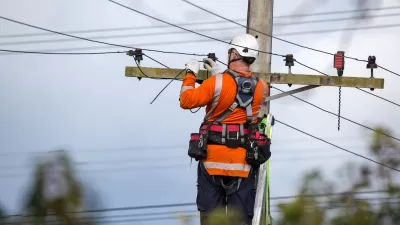Recent devastating weather events highlight the importance of community connection in keeping people safe when infrastructure fails.

Writing in Next City, Yvonne Marquez highlights the importance of mutual aid networks in keeping communities safe during emergencies like extreme weather events
Marquez provides the example of Susana Edith from Texas, where a 2021 winter storm caused debilitating damage to infrastructure across the state and killed hundreds of people. “Edith is the founder of Lucha Dallas, a community-based collective that coordinated with other mutual aid groups in North Texas to bring food, warm clothing, sleeping bags and tent warmers to their unhoused neighbors; they even raised cash donations to pay for hotel rooms for those who could not access shelters.” As Marquez points out,
The practice is nothing new. Communities of color and other marginalized groups have long relied on mutual assistance when government services fell short. But now, many frontline communities are taking up the practice as a way to become more resilient in the face of increasingly extreme weather.
“Mutual aid is predicated on the understanding that everyone in a community has something to contribute and may need help at some point.” Research shows that more connected communities tend to fare better during weather crises.
The rise of mutual aid networks also exposes a crisis of governance in many U.S. cities, where local agencies fail to provide sufficient assistance to their most vulnerable constituents.
FULL STORY: Knowing Your Neighbors Could Save You From The Next Climate Disaster

Study: Maui’s Plan to Convert Vacation Rentals to Long-Term Housing Could Cause Nearly $1 Billion Economic Loss
The plan would reduce visitor accommodation by 25,% resulting in 1,900 jobs lost.

North Texas Transit Leaders Tout Benefits of TOD for Growing Region
At a summit focused on transit-oriented development, policymakers discussed how North Texas’ expanded light rail system can serve as a tool for economic growth.

Using Old Oil and Gas Wells for Green Energy Storage
Penn State researchers have found that repurposing abandoned oil and gas wells for geothermal-assisted compressed-air energy storage can boost efficiency, reduce environmental risks, and support clean energy and job transitions.

Santa Barbara Could Build Housing on County Land
County supervisors moved forward a proposal to build workforce housing on two county-owned parcels.

San Mateo Formally Opposes Freeway Project
The city council will send a letter to Caltrans urging the agency to reconsider a plan to expand the 101 through the city of San Mateo.

A Bronx Community Fights to Have its Voice Heard
After organizing and giving input for decades, the community around the Kingsbridge Armory might actually see it redeveloped — and they want to continue to have a say in how it goes.
Urban Design for Planners 1: Software Tools
This six-course series explores essential urban design concepts using open source software and equips planners with the tools they need to participate fully in the urban design process.
Planning for Universal Design
Learn the tools for implementing Universal Design in planning regulations.
Ascent Environmental
Borough of Carlisle
Institute for Housing and Urban Development Studies (IHS)
City of Grandview
Harvard GSD Executive Education
Toledo-Lucas County Plan Commissions
Salt Lake City
NYU Wagner Graduate School of Public Service





























